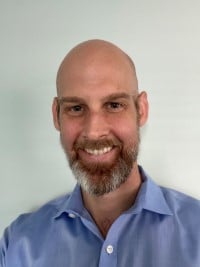Soon after he became board certified in addiction medicine in 2020, Dr. Andrew King, an emergency physician, started working at an opioid treatment program on Wednesday mornings.
While he originally thought of this time as a professional break from the quick pace of the emergency department, he found an unexpected sense of satisfaction working at the methadone clinic. That satisfaction still endures today.

Dr. Andrew King
“It’s my favorite day of the week,” said Dr. King, who is also board certified in emergency medicine and medical toxicology. “It helps me gain a new and deeper perspective on patients, seeing them outside the hospital, getting more insight as to what their home life is like, their background, and the way they view the medical establishment overall. After multiple visits, you really get to know the patient as a person, which is not something that you get to do, per se, as an emergency physician.”
Dr. King is an attending physician at Sinai Grace Hospital, Detroit Receiving Hospital, and the Michigan Poison and Drug Information Center, all in Detroit. At the latter, he also serves as a medical toxicologist.
His time at the clinic has helped him better treat patients with addiction in the emergency setting — an often high-stress environment where physicians see patients on their worst days.
“It really does help with having more empathy for patients and gives me the motivation to keep going and helping,” he said. “When I see them, I feel energized, and any burnout from my shift evaporates.”
Dr. King added that he wouldn’t have gained this new, valuable perspective without becoming board certified in addiction medicine.
“It has 100 percent increased my satisfaction with emergency medicine,” he said.
Benefits of Certification
Emergency medicine residents seeking to become certified in addiction medicine can do so through the American Board of Preventive Medicine (ABPM) or the American Osteopathic Association (AOA).
To become certified through the ABPM, applicants must have graduated with a medical degree, hold a current medical license, and have a current primary American Board of Medical Specialties (ABMS) board certification. Those who meet these initial qualifications can apply through two eligibility pathways: (1) time in practice, or (2) the successful completion of a 12-month Accreditation Council for Graduate Medical Education (ACGME) addiction medicine fellowship program.
To become certified through the AOA, applicants with an active license and a current primary AOA or ABMS member board certification can apply through two eligibility pathways: (1) clinical practice, or (2) completion of an AOA- or ACGME-accredited addiction medicine fellowship program. To qualify for the clinical practice pathway, one must have time in practice, hold an active American Board of Addiction Medicine (ABAM) certificate, or have completed an American College of Academic Addiction Medicine (ACAAM) fellowship within the five years prior to the application start date for that year.
Altogether, the certification process can take about a year. The ABPM and the AOA offer four- to five-month application windows during the year, with exams in the fall. Applicants are notified of their exam results in the first quarter of the following year.
There are many benefits to becoming certified in addiction medicine. Emergency physicians who do so add value to their employer and become thought leaders on addiction medicine.
The American Society of Addiction Medicine’s (ASAM’s) fellowship membership category (FASAM/DFASAM) gives recognition to and raises awareness of ASAM physician members who are board-certified addiction medicine specialists.
Each of these benefits helps advance the physician’s career. Additionally, specialists tend to have greater earning potential. It’s estimated that physicians with board certification earn 67 percent more than those without certification.
Some emergency physicians with addiction medicine certification also may gain access to federal loan repayment funds. Congress has appropriated funding for student loan repayment of up to $250,000 for physicians who become addiction medicine specialists and practice for six years in designated geographic areas.
Emergency physicians specializing in addiction medicine can earn continuing education credits through ASAM that meet maintenance-of-certification requirements for their licenses, their primary ABMS or AOA certifications, and their addiction medicine specialist requirements.
Make a Difference
Dr. King, now fellowship director of the Detroit Medical Center/Wayne State Medical Toxicology fellowship, received his addiction medicine certification through ABPM. He said it was a “challenging test” that was “fun to study for,” and that the application process was more rigorous than he expected.
“After two attempts, I was eligible to sit for the board exam,” he shared. “If you're going to apply, don't wait until the last minute and assume everything's going to be OK.”
He added that today’s emergency medicine residents are needed in the fight against addiction, especially when it comes to the ongoing opioid epidemic. Those who become certified in addiction medicine will be more equipped to change patients’ lives.
“You can diagnose and pick up on maladaptive patterns, undisclosed motivations, and a person’s logic for taking or not taking certain actions much more readily when you have a background in addiction and talk to patients with substance use disorder frequently,” Dr. King said. “You can establish a connection with them that they know that you know. That is therapeutic almost immediately. You can see their sigh of relief. It’s like, ‘OK. I can talk about this with somebody.’”
Treating patients with addiction often poses multiple challenges in the emergency medicine setting, but the depth of knowledge that the certification process provides can help emergency physicians experience breakthroughs with these patients, making a lasting difference in their lives — even during their relatively quick visits to the emergency department.
“We see people with substance use disorders every day,” Dr. King said of these challenges in treating patients. “And when you do it right, treat them with respect and dignity, you’ll get unexpected hugs from patients that just make it all worthwhile.”
RESOURCES
To learn more about the need for physicians to become certified in addiction medicine, join National Addiction Treatment Week from Oct. 17-23 at treataddictionsavelives.org and on social media at #treatmentweek and #treatmentweek2022.
For information on certification, visit:
American Society of Addiction Medicine (ASAM)
ASAM Guide to Addiction Medicine Certification
American Board of Preventive Medicine (ABPM)
American Osteopathic Association (AOA)
American Board of Medical Specialties (ABMS)
Accreditation Council for Graduate Medical Education (ACGME)
American Board of Addiction Medicine (ABAM)
American College of Academic Addiction Medicine (ACAAM)
American Society of Addiction Medicine (ASAM) fellow designation (FASAM/DFASAM)
Detroit Medical Center/Wayne State Medical Toxicology fellowship
This article is a special contribution from the American Society of Addiction Medicine (ASAM).



